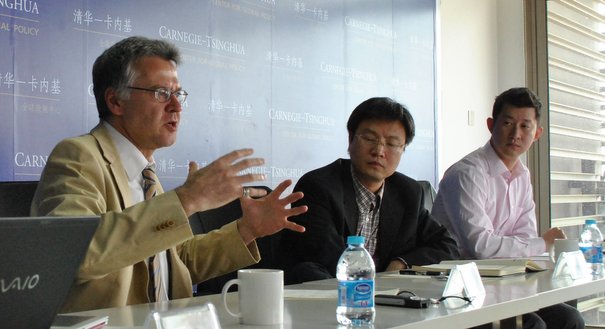Registration
You will receive an email confirming your registration.
IMGXYZ3765IMGZYXDespite consensus over the growing need to address climate change, many countries have yet to implement necessary policy reform. Meanwhile, many major countries are facing elections in 2012, where the economy is dominating the political scene, potentially hindering progress on forming agreements for measures to combat climate change. In order to achieve the 50 percent reduction in greenhouse emissions by 2050 that scientists are calling for, the international community needs to take action quickly. Any global climate change agreement, however, has been undermined by competing political and economic interests, particularly between developed and developing nations.
The Carnegie-Tsinghua Center hosted Professor Thomas Bernauer of Swiss Federal Institute of Technology in Zurich to discuss why a consensus on creating an international climate change agreement has been difficult to achieve. Zhang Haibin of Peking University and Li Ting of Tsinghua University joined the discussion. Carnegie-Tsinghua’s Wang Tao moderated the discussion.
Barriers to a Solution
- Long-term Solutions Difficult: Bernauer argued that changing politics and leadership transitions make it difficult to maintain the kind of long-term commitments that are necessary for effective climate change policy. As a result, current policy dialogues can only produce short-term solutions with no guarantee of long-term compliance, he concluded. Zhang added that climate change is difficult to tackle because it is a contentious topic due to the potential economic impact of measures and due to a lack of leadership.
- Free-Riders: Many nations feel it is not necessary to develop and implement climate change policies of their own because they could benefit from the existing policies of other nations, Bernauer said. He added that while democratic nations have generally made higher levels of commitment, there is no substantial difference in the actual measures taken by either democracies or non-democratic nations.
- Developing vs Developed Nations: The conflict between developing and developed nations over the historical responsibility for environmental issues has been the chief hold-up in climate change talks, Bernauer explained. The differences in their societal and political goals make far-reaching agreements difficult to achieve. Most of the developed nations peaked in terms of carbon emissions during the 1960s and 1970s. Since the majority of the world’s population lies in developing nations which have no opportunity or capacity to industrialize, Bernauer explained that there is a lack of incentive to tackle climate change issues in these nations. He added that if rich nations continue claiming that the cost of reforms is too high, less wealthy nations will certainly not be able to meet the same goals.
Potential Leaders for Climate Change Policy Reform
- The Proactive EU: The EU has been the most proactive when it comes to tackling climate change, Bernauer said. He explained that the EU had a head start due to the collapse of many Eastern European economies in the late twentieth century. The political slant of the EU’s social policy also lends itself towards acceptance of policy reforms that support environmental protection. The EU has the capacity to lead the global fight against climate change, according to Zhang, but it has been considerably weakened by the economic crisis and may not be able to rise to the challenge.
- China’s Potential Influence: Zhang argued that China does not have the capacity to become a global leader in tackling climate change, but added that China’s progress on carbon emissions has far exceeded that of other comparable nations. Li pointed out that between 1990 and 2010, China’s carbon emissions were reduced by 57 percent. This achievement is unprecedented and a sign of China’s dedication to combating climate change, as it was under no international obligations to adopt measures during that time, Li added. The participants addressed the tensions between China and the United States over which nation is responsible for taking the first step in climate change policy. Li asserted that China is willing to take action to tackle climate change, but under the Kyoto Protocol it is the responsibility of developed nations to take the first initiatives, as well as to help developing countries to reduce emissions and adapt to the severe impacts of climate change.
The Future of Climate Change
- Rio: As the Kyoto Protocol is increasingly seen as a failure, many nations wonder if the conference this year in Rio will provide any solutions. However, Bernauer expressed reservations on how positive the outcome might be from the Rio+20 Summit.
- Building Trust: Li further emphasized that it is very important to build mutual trust between the developing and developed nations. China is particularly concerned about the issue of fairness in climate change obligations. He warned that the current inaction by the United States on climate negotiation is perceived as unfair by much of the international community, when developing countries like China are undertaking ambitious climate policies and measures. One of the major obstacles to international negotiations will be convincing the United States to get on board with policy changes, as U.S. emissions per capita are twice that of any EU nation and triple that of China, Li concluded.
- Challenges: International economic downturns have a profound impact on the ability of nations to commit to policy changes, the participants concluded. But the main hurdle remains the lack of leadership and nations avoiding the responsibility to lead on climate change policy.
